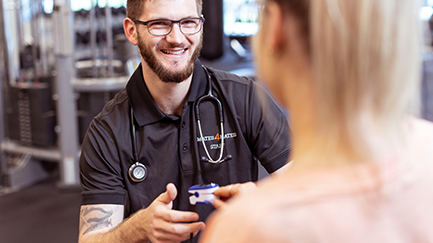There are countless ways to move and exercise, but knowing where to start can sometimes be difficult. So, how can you find a way to move that is right for your body and that you enjoy?
Exercise Right Week, held annually in May by Exercise & Sports Science Australia (ESSA), aims to highlight the benefits of exercise for your health and wellbeing.
This year’s theme, ‘Just Move’ provides a simple reminder that daily movement can provide short- and long-term benefits for both your physical and mental health.
In the short-term, exercise and movement helps to increase our heart rate and flexibility, and releases serotonin, dopamine and endorphins – our bodies ‘feel-good’ chemicals.
Long-term benefits include reducing a person's risk of developing chronic health conditions, improving strength and mobility, lowering the resting heart rate, and boosting mental wellbeing by consistently releasing those beneficial chemicals.
What’s the difference between exercise and movement?
Exercise is structured, planned, and intentional use of our bodies, usually aimed at improving some aspect of fitness such as strength, endurance or mobility.
Movement is a broader term, and while it does encompass exercise, it refers to anything that requires our muscles to move in a controlled manner, although it isn’t usually structured or necessarily targeting a specific fitness goal.
It is a common thought process within the Defence community that for something to be considered exercise it has to be of a certain intensity or duration. However, this isn’t the case. Both our bodies and minds can benefit from a range of different modes and intensities when it comes to our daily movement, and it doesn’t have to look the same each time.
Speaking with an exercise physiologist is a good place to start when searching for a way to maximise daily movement. Exercise physiologists can help you to find the best kind of daily exercise for you, one that you enjoy without feeling pressure or stress to ‘get it done’, while also meeting your body’s movement needs and goals.
Adding more movement into your day
For people struggling to find time for daily exercise, there are many ways to add movement to your daily routine to wake up your muscles and keep them active, including:
- Waiting for the kettle to boil? Add in some calf raises.
- Waiting for dinner to heat up in the microwave? Throw in some squats.
- Brushing your teeth in the morning? Lunge it out.
- Parking a little further away from the shops to increase your step count!
- Take the stairs over the lift if you are able to.
- Add a five-minute stretch routine into your morning.
Finding the motivation for daily movement
Exercise or movement shouldn’t feel like a chore, so choosing something you enjoy is important. Think about why you want to move, or what you want to be able to do.
Research has shown that when you do exercise or movement that you enjoy, you are more likely to engage in it repeatedly, helping you form a habit of daily movement.
Every little bit counts, so start small. Try a new activity with a family member or a friend to keep each other accountable while finding the exercise that works for you.
If you’re planning to exercise in the morning, get ready the night before by laying out your exercise clothes. If you’re going after work, have your bag packed and ready in the car, so you can avoid detouring home.
Support at Mates4Mates
Mates4Mates offers veterans and family members access to exercise physiologists in our centres in Townsville, Stafford and Ipswich. Our exercise physiologists can provide one-on-one sessions and work with you to find the right place to start or book you in for one of our group exercise physiology programs.
Mates4Mates social connection activities are also held across all regions in Queensland, Tasmania and the Northern Territory, and there are a number of active events for the veteran community to get involved in, including golf, wheelchair rugby, yoga and Tai Chi, hiking, and more.
For more information about Mates4Mates services and how we can help to support you, reach out to us on 1300 4 MATES (62 837) for a confidential chat.
Written by Cathy Rowe, Mates4Mates Exercise Physiologist





